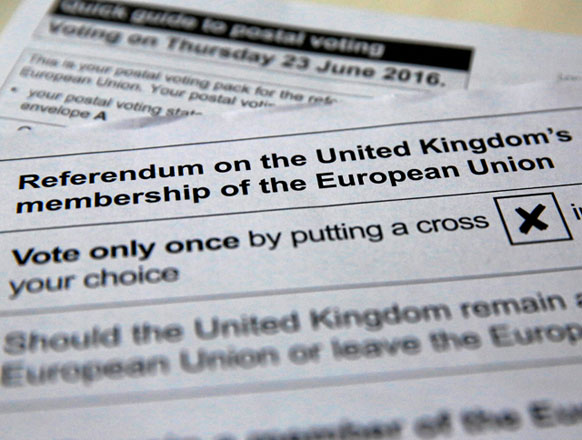DUBAI/LONDON — Gulf Arab investors, some of the biggest buyers of British real estate, are holding back from new deals because they fear a property price slump if Britain leaves the European Union, according to legal and investment sources.
Sovereign and private investors from Qatar, Saudi Arabia, Kuwait and the United Arab Emirates have been prolific buyers of British assets in the past decade, snapping up billions of dollars worth of property, mostly in London.
"Sovereign wealth funds are concerned that Brexit is taking its toll on the property market in London," said a London-based lawyer who works with some of the largest Gulf funds. He declined to be named, citing the confidential nature of his work.
"The situation will further deteriorate if there's a Brexit vote."
The value of residential property in upmarket areas popular among Gulf investors — including Chelsea, South Kensington and Knightsbridge — fell between 3.5 and 7.5 per cent on the year in May, according to estate agent Knight Frank.
Gulf family businesses and private investors are heavily involved in London real estate.
Investors from the UAE accounted for more than 20 per cent of buy-to-let property sales in the UK in 2015, said Amit Seth, the Middle East and North Africa head of international residential developments at London-focused real estate agency Chestertons.
"At the moment it seems clear people are little bit more sceptical on making an investment today because of Brexit," said Seth, who is based in Dubai, referring to private Gulf investors in residential real estate.
He said investors were still researching opportunities and discussing them with his company, but not finalising deals.
While the precise impact on Gulf investments is unclear, overall flows of foreign capital into commercial real estate in Britain stopped in the first three months of 2016, Bank of England Governor Mark Carney said in April. Business investment in the country also fell in early 2016, statistics showed this week.
London landmarks
Gulf investors also have broader worries about their investments in other sectors and how a possible Brexit in a June 23 EU referendum could affect the British economy, the sources said.
A YouGov poll for the Times newspaper showed an even split between "Remain" and "Leave" voters on Wednesday.
There is no suggestion long-term investors from the Gulf will exit assets en masse if Britain votes out, but many are worried about the impact on portfolios and wider economic effects, a senior Gulf government official said.
"Of course, we are worried about what will come next if the British decide to leave the EU," the official said. "We think that there will be a negative impact on our investments in the UK because the selling [prices] will go down and the banks in England will face some difficulties."
Asked to comment on Gulf investor concerns, Tobias Ellwood, a British Foreign Office minister, said the EU referendum was a significant event that had been discussed as part of regular bi-lateral engagements covering a wide variety of areas.
"But [it] has not been raised in any form in relation to impact on investment opportunities, which go from strength to strength," he told Reuters in Qatar's capital Doha on May 21.
Sheikh Hamad Bin Jassim Bin Jaber Al Thani, a former Qatari prime minister and investment chief who oversaw much of the Gulf state's UK acquisitions, has spoken out against a "leave" vote.
"In the Middle East we all want to see a strong Europe, and believe that economic integration is key to making it stronger. In fact, we believe the UK should not only be part of the EU but should lead it," he told Reuters, describing the City of London as the "financial capital of the world".
Qatar is one of the most high-profile investors in London, owning landmarks such as the Shard skyscraper, Harrods department store and Olympic Village, as well as luxury hotels.
While the Qatar Investment Authority wealth fund has been diversifying its portfolio away from Europe towards more investments in the United States and Asia in the last couple of years, it is still heavily invested in Britain and holds stakes in Barclays, Royal Dutch Shell and Sainsbury's.
If Britain votes to leave "then you are going to see a big hit to investments", said a senior Qatari banker who does business with sovereign and private investors.
He said investors were still working on deals without finalising them until the picture becomes clear. "They are watching to see what happens, but people are continuing to work on new things as they take months to get done."
